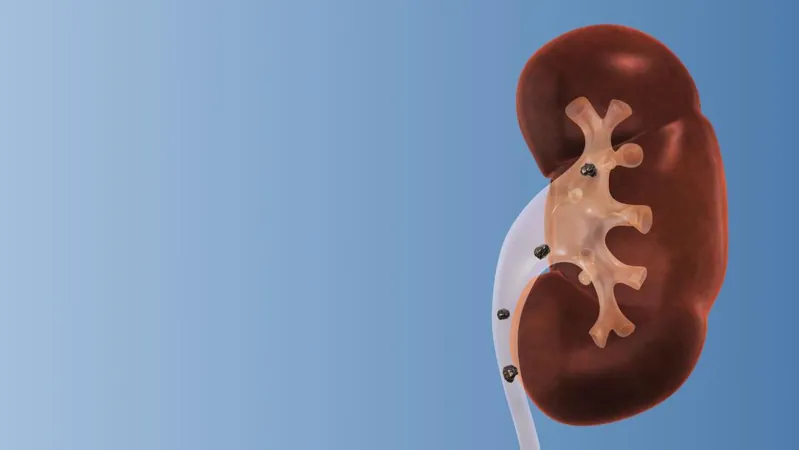
The Surprising Surge of Kidney Stones in Children: What Parents Need to Know!
2025-01-04
Author: Ling
Recent reports reveal a troubling trend: more children than ever are suffering from kidney stones. This alarming shift in pediatric health has garnered the attention of medical professionals, prompting a closer examination of the factors at play. While some data dates back to a 2016 study examining South Carolina teenagers, which found a 23% rise in kidney stone cases among boys and a staggering 28% in girls from 1997 to 2012, the issue continues to emerge in various pediatric clinics today.
In fact, doctors like those at Texas Children's Hospital are witnessing this phenomenon firsthand, with one pediatric urologist stating that they see children with kidney stones on a daily basis. Gregory Tasian, a pediatric urologist at Children's Hospital of Philadelphia, reports that the increase over the past three decades has been nothing short of dramatic, sparking concern among healthcare providers.
Kidney stones—hard deposits of minerals and salts that can block the urinary tract—were traditionally associated with middle-aged white men. However, current trends suggest that children are increasingly affected. Various theories have surfaced in an attempt to explain this unexpected rise, including genetics, the consumption of ultra-processed foods, high sodium intake, and dehydration.
Duke Health pediatric urologist John Wiener emphasizes the impact of dietary changes, noting that today's American diet is oversaturated with added salt. This excess sodium affects the kidneys, which excrete the sodium but inadvertently pulls calcium alongside it, thereby increasing the risk of developing calcium-based stones. Disturbingly, statistics show that nearly 90% of children aged 6 to 18 consume almost 150% of the recommended daily sodium intake, exacerbating the issue.
Another intriguing hypothesis links kidney stones to climate change. Research from Mayo Clinic pediatric nephrologist David Sas suggests that "urban heat islands," densely populated urban areas with minimal greenery that experience higher temperatures, may contribute to this health crisis. A 2023 NBC News article supports this theory, highlighting that cases of kidney stones in children peak during the summer months when kids sweat more and, consequently, urinate less.
As this troubling trend continues to unfold, parents need to be aware of the symptoms of kidney stones, which can include severe abdominal or back pain, nausea, and blood in the urine. Consulting healthcare professionals if these symptoms arise is crucial. According to the National Kidney Foundation, one in ten Americans will experience a kidney stone at some point in their lives. With rising numbers among children, it may be time for families to reassess dietary habits and hydration practices to mitigate this growing health threat.
Stay informed and proactive—your child's health may depend on it!


 Brasil (PT)
Brasil (PT)
 Canada (EN)
Canada (EN)
 Chile (ES)
Chile (ES)
 Česko (CS)
Česko (CS)
 대한민국 (KO)
대한민국 (KO)
 España (ES)
España (ES)
 France (FR)
France (FR)
 Hong Kong (EN)
Hong Kong (EN)
 Italia (IT)
Italia (IT)
 日本 (JA)
日本 (JA)
 Magyarország (HU)
Magyarország (HU)
 Norge (NO)
Norge (NO)
 Polska (PL)
Polska (PL)
 Schweiz (DE)
Schweiz (DE)
 Singapore (EN)
Singapore (EN)
 Sverige (SV)
Sverige (SV)
 Suomi (FI)
Suomi (FI)
 Türkiye (TR)
Türkiye (TR)
 الإمارات العربية المتحدة (AR)
الإمارات العربية المتحدة (AR)